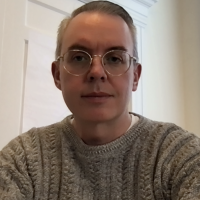More and more what I’m noticing about what it means to me to be a Buddhist is that it is really simply about being human.
I am a Buddhist in order to be more fully human. Buddhism is just a word—and a word that has a whole lot of different connotations.
I’m not sure what the term Buddhist means to others, especially non-Buddhists, but I imagine that it brings up all kinds of different imagery and ideas that are probably, in some sense, superficial—meaning appearance based, but also behavioral based upon pop culture references and ideas of sweet ascetic monks.
But really, Buddhism, at least to me, is very pragmatic and ordinary. I was at a program a few years ago where the President of Shambhala, Richard Reoch, noted that Chogyam Trungpa’s highest teaching was that there is absolutely no difference between the sacred and the secular.
Meditation, the primary and most important activity in my “Buddhist” practice is decidedly secular. It ultimately is just sitting down and looking at one’s mind and experience.
My pre-Buddhist life was primarily something that occurred in the conceptual or intellectual realm. The experience of letting go, to some extent, of that experience and beginning to feel life and being alive is, to me, precisely an exercise of becoming more fully human—and also of experiencing more accurately things (sensory perceptions primarily) more nakedly and directly.
It is a more simple, in some sense, and intuitive experience. It is touching in on the underlying sense of well-being and sanity that we call basic goodness in Shambhala.
What the meditation technique affects in my experience is a relaxation of the grip of ideas, projects and agendas (including the idea of being a Buddhist) that are at play in my life. This freedom allows an appreciation of life just as it is, without the need for embellishment or justification.
To me, this is not a particularly religious or spiritual experience. But, what it does evoke is gratitude for the fortunate circumstance I see of being a human being on this Earth—and further that there could be no better scenario possible (that I am aware of).
Of course, not everyone is so fortunate in their circumstance in this life. That is precisely why the bodhisattva works to create this experience for others.
I also can see why Alan Watts once chose to describe Buddhism as the religion of no religion, or why His Holiness the Dalai Lama would describe his religion simply as kindness.
I am extremely and unequivocally grateful for the Buddha, Buddhism, and all of the great teachers, especially my own, who have carried on this wonderful tradition for the past 2,600 years, but I also do not see the end game as being a “proper” Buddhist, but instead to really experience the miraculous wonder of what it means to be human.
Love elephant and want to go steady?
Sign up for our (curated) daily and weekly newsletters!
Photo: Yudi Prabowo/Pixoto












Read 15 comments and reply